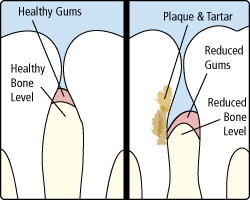Gum Disease Treatment and Prevention in Woodbridge, Alexandria, and Fairfax, VA

Gum disease is the breakdown of the soft tissue and/or bone that support the teeth. It is caused by an excess of plaque and bacteria. If plaque is not removed properly on a daily basis by brushing and flossing, gums can start to become inflamed and lead to further problems.
Types of Gum Disease
There are two stages of gum disease: gingivitis and periodontitis.
Gingivitis is literally translated into inflammation of the gingiva or inflamed gums. This is the body’s first warning that something is not right and can include signs such as redness and bleeding. This is the only reversible stage of gum disease.
The signs and symptoms of periodontitis can vary between patients. Some common signs include bad breath, swelling/puffiness of the gums, redness, bleeding, pus/suppuration, recession, mobility of teeth, and the worst-case scenario, teeth falling out. While we can treat periodontitis, it cannot be completely reversed.
Gum Disease Risk Factors
In addition to having poor brushing and flossing habits, there are many factors that that can lead to gum disease. These include:
- Smoking or using chewing tobacco
- Diabetes
- The use of certain types of medication such as steroids, anti-epilepsy drugs, cancer therapy drugs, calcium channel blockers, and oral contraceptives
- Bridges that no longer fit properly
- Crooked teeth
- Old fillings
- Pregnancy
Preventing Gum Disease
Here at Nova Dental Partners, we check your gums at every cleaning visit. We measure pocket depth and explain what the numbers mean. We take into account your home care and give instruction on how to prevent gum disease with simple brushing and flossing. While most dental offices are capable of doing scaling and root planing, we want you to understand the “how and why” of gum disease so you can be an active participant in your oral health.
Treating Gum Disease
The gum disease treatments offered at our Fairfax, Woodbridge and Alexandria, VA dental offices vary depending on the severity of each individual case. Typical treatments include:
- Non-surgical treatments such as at-home antibiotic trays, and scaling and root planing (deep cleaning)
- Periodontal surgery and laser gum surgery
- Dental implants to replace teeth lost due to periodontitis

